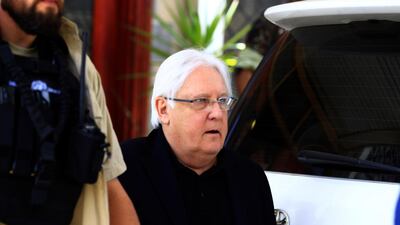Martin Griffiths, the UN special envoy for Yemen, said on Monday that the country's warring factions had finally agreed on terms for a withdrawal of troops from the Red Sea Port of Hodeidah.
Implementation of a limited peace deal between Yemen's government and Houthi rebels, who have been fighting since 2015, has been delayed for months.
The agreement said troops and fighters would be withdrawn from Hodeidah in the first phase of a ceasefire agreed to in December but there have been repeated disagreements over who would take their place to secure the port.
“I am happy to announce that both parties have now accepted the detailed redeployment plan for phase one,” Mr Griffiths told the UN Security Council by video link.
“I am grateful to both parties for the constructive engagement that has allowed us to reach this point.
"We will now move with all speed towards resolving the final outstanding issues related to phase two and the status of local security forces.”
But Mr Griffiths has made similar announcements in recent months without the situation changing in Hodeidah.
The four-year conflict in Yemen has shattered its economy and created one of the world's worst humanitarian crises.
More than 10,000 civilians have been killed and an estimated 10 million people have been driven to the brink of famine.
The ceasefire, which was meant to speed up the delivery of humanitarian aid, does not apply to the rest of the country.
Fighting has flared, especially in recent weeks with the situation in Hodeidah in deadlock.
Under the peace plan, troops and fighters were supposed to be replaced by local forces but there has been no publicly disclosed details on how that is to occur.
An Arab-led military coalition supports the government whereas the rebels are backed by Iran.
A letter submitted by the Arab Coalition to the UN Security Council last week detailed more than 3,000 rebel breaches of the ceasefire in Hodeidah.
But Mr Griffiths, who led the UN-brokered talks in Sweden, said the prospect of full-out war remained as real today as when he took the job of special envoy a year ago.
“At any time war can take the chance of peace off the table,” he told the council. “Our pursuit of peace is measured against the lives and livelihoods daily lost across the various governorates of Yemen.
"This explains my persistence in planning, hoping and pushing for a start of consultations leading to that political solution.”
Michael Lollesgaard, who leads the UN mission in Yemen and chairs a committee set up to implement the ceasefire, has been talking with both sides for weeks.
“Let us be clear that when these redeployments happen they will be the first voluntary withdrawals of forces in this long conflict,” Mr Griffiths said.
“It is not an easy decision for the parties to take and I don't take their commitment lightly. Of course it is taking longer than we had hoped but that it should happen at all is extremely welcome.”
But he said there was also a need for a new round of peace negotiations.
“I would be derelict in my duty if I was not also preparing the ground for political consultations, not least because the war in Yemen shows no signs of abating,” Mr Griffiths said.
Mark Lowcock, the UN's undersecretary general for humanitarian affairs and emergency relief co-ordinator, told the council that there had been “a pronounced escalation of violence in other parts of the country”.
The Arab coalition on Monday said that the Houthis two days ago used drones to target Yemen's first parliamentary session since 2015, which took place in Hadhramawt, a province in the centre of the country.
Eleven unmanned aircraft had been intercepted and destroyed, coalition spokesman Col Turki Al Malki said.
“We welcome the convening of the Yemeni Parliament,” Col Al Malki said in the Saudi capital Riyadh. “It signified the isolation of the Houthi militia.”
The Houthis are continuing to store weapons and drones in civilian areas in the capital Sanaa and are using people as human shields, he said.

